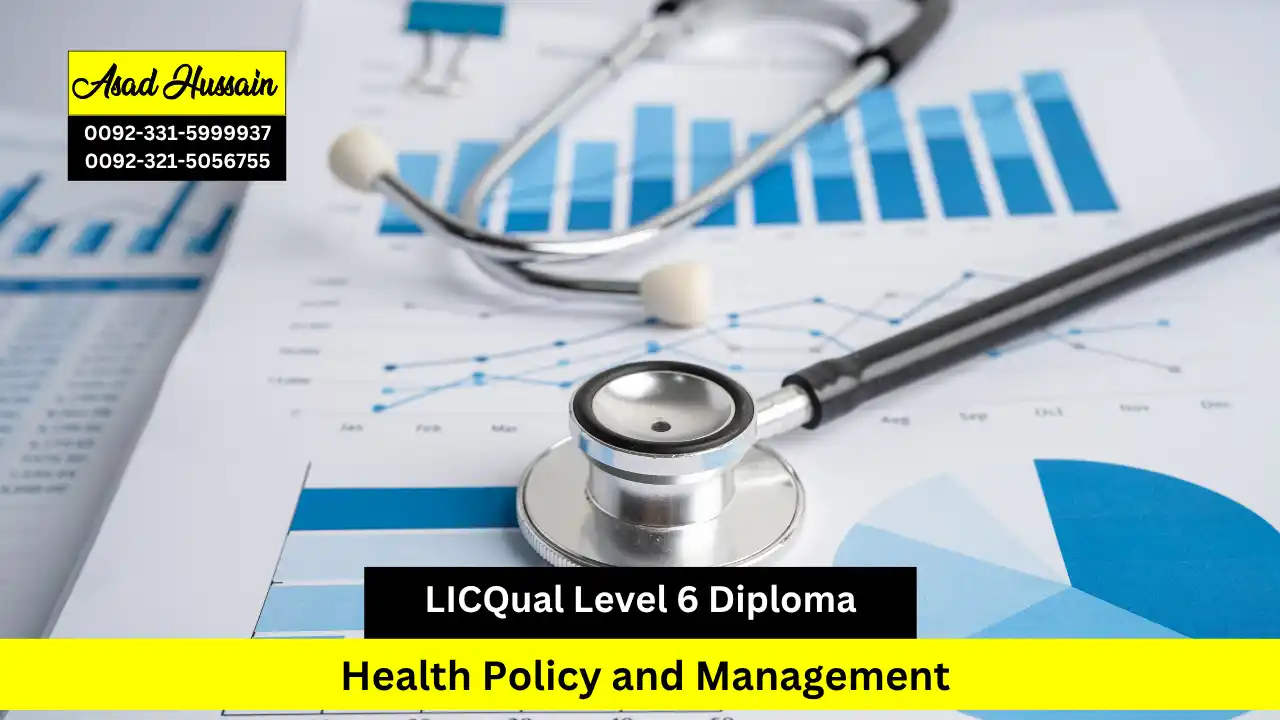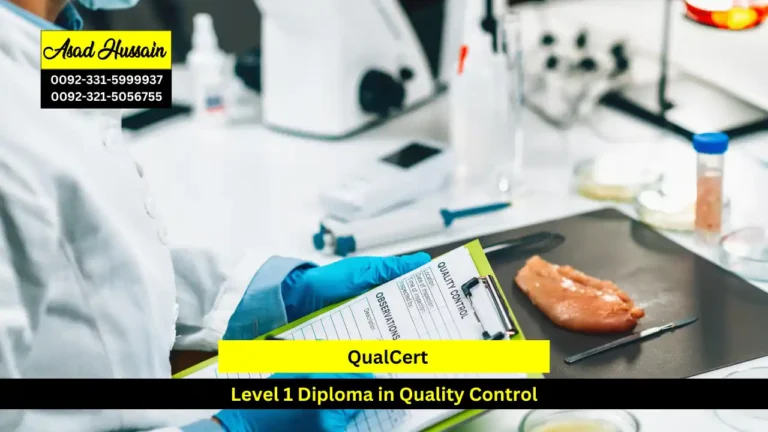The LICQual Level 6 Diploma in Health Policy and Management provides an advanced learning platform designed for professionals who aspire to make meaningful contributions to the healthcare sector. As global health systems face challenges such as policy reform, accessibility, and resource allocation, this diploma equips learners with the critical skills to navigate and influence the healthcare landscape effectively.
LICQual Level 6 Diploma in Health Policy and Management focuses on developing a comprehensive understanding of how policies are created, implemented, and evaluated within healthcare systems. The course explores a wide range of topics, including health governance, ethical decision-making, and evidence-based policymaking. It aims to prepare learners to assess the effectiveness of existing health programs while developing strategies that drive improvement and innovation across different healthcare settings.
Learners pursuing the LICQual Level 6 Diploma in Health Policy and Management will gain advanced knowledge in areas such as strategic health planning, financial management, and organizational leadership. The curriculum integrates theoretical frameworks with practical insights to ensure a balance between academic learning and real-world application. By mastering these concepts, graduates are well-prepared to take on senior management roles or advisory positions in health-related organizations.
One of the key strengths of this health management course is its emphasis on practical application. Through interactive assignments, case studies, and research projects, students learn to address real-life healthcare challenges using analytical and policy-driven approaches. The course also emphasizes leadership and communication skills—enabling learners to lead teams, manage change, and implement effective health programs with measurable outcomes.
This Level 6 Diploma in Health Policy and Management is ideal for professionals working in public health, hospitals, NGOs, and government agencies who wish to enhance their strategic management capabilities. It also provides a strong foundation for those planning to pursue postgraduate qualifications in health administration or policy development. Graduates emerge with the confidence to design, implement, and evaluate health policies that promote efficiency, equity, and sustainability.
Program Highlights
Mandatory Units
- Principles of Health Policy
- Healthcare Management and Organisational Leadership
- Strategic Planning and Resource Management
- Health Law, Ethics, and Governance
- Policy Analysis and Evaluation
- Change Management and Organisational Development
The LICQual Level 6 Diploma in Health Policy and Management is a professionally designed qualification aimed at individuals who aspire to play a crucial role in shaping and managing health policies and systems. As healthcare continues to face challenges such as resource allocation, equity, and policy reform, this program equips learners with the analytical, strategic, and leadership skills necessary to address these issues effectively. The qualification provides a strong foundation for those seeking to influence healthcare delivery and policy development in public, private, or non-governmental sectors.
Age Requirements
- Applicants must be at least 18 years old at the time of enrolment.
- Candidates under 18 may be considered only with written parental or guardian consent and evidence of maturity and readiness for higher-level study.
Educational Requirements
- A minimum of a high school diploma (or equivalent) is required.
- Previous study in healthcare management, public health, social sciences, or public administration is advantageous but not mandatory.
Professional Experience
- While not compulsory, 1–2 years of experience in healthcare administration, policy development, or management is preferred.
- Practical exposure to healthcare planning, program coordination, or policy analysis provides learners with a stronger foundation for this program.
English Language Proficiency
- Strong English reading, writing, and communication skills are essential for successfully completing this diploma.
- International applicants must provide proof of English proficiency through recognized assessments such as IELTS (minimum score of 5.5) or an equivalent qualification.
Learners who meet these entry requirements will be well-prepared to excel in the LICQual Level 6 Diploma in Health Policy and Management, developing advanced knowledge in policy formulation, health systems governance, strategic planning, and public health leadership. The program emphasizes evidence-based decision-making, ethical governance, and sustainable health development. Learners will gain the ability to evaluate health programs, manage resources efficiently, and contribute to health sector reforms that improve service quality and accessibility.and improved patient outcomes in modern healthcare environments.
The LICQual Level 6 Diploma in Health Policy and Management equips learners with advanced theoretical knowledge and practical skills to address the complexities of health systems, governance, and policy design. This qualification is tailored for professionals seeking to influence health policy decisions, manage healthcare organizations, and lead transformative initiatives that enhance healthcare delivery and equity. Upon completion, learners will demonstrate strong analytical, strategic, and leadership competencies applicable across public health, government, and private healthcare sectors.
Principles of Health Policy
- Understand the fundamental concepts, frameworks, and determinants that shape national and international health policies.
- Analyse the impact of social, economic, and political factors on the development and implementation of health policies.
- Evaluate the roles of key stakeholders—including governments, NGOs, and international agencies—in health policy formulation.
- Apply evidence-based approaches to assess policy effectiveness and propose strategic improvements.
- Demonstrate the ability to link health policy principles with real-world public health outcomes and system performance.
Healthcare Management and Organisational Leadership
- Develop comprehensive knowledge of healthcare management practices and organizational structures.
- Apply effective leadership models to manage multidisciplinary teams in healthcare environments.
- Demonstrate decision-making, communication, and negotiation skills required for successful healthcare leadership.
- Evaluate organizational performance and implement strategies to promote efficiency and service quality.
- Foster a culture of accountability, collaboration, and continuous improvement within healthcare organizations.
Strategic Planning and Resource Management
- Understand the core principles of strategic planning and their application within healthcare institutions.
- Develop skills to design, implement, and monitor healthcare strategies aligned with policy goals.
- Apply budgeting, financial management, and resource allocation methods to optimize operational efficiency.
- Evaluate the effectiveness of resource utilization and propose strategies for sustainable healthcare delivery.
- Integrate innovation and technology to enhance healthcare planning and management processes.
Health Law, Ethics, and Governance
- Demonstrate understanding of legal frameworks, policies, and ethical standards governing healthcare systems.
- Apply principles of medical ethics and human rights to policy formulation and healthcare decision-making.
- Evaluate the implications of healthcare laws, regulations, and governance mechanisms on service delivery.
- Identify ethical challenges in healthcare leadership and propose strategies for maintaining integrity and transparency.
- Promote compliance, accountability, and patient rights within organizational and policy contexts.
Policy Analysis and Evaluation
- Develop the ability to critically analyse health policies using established policy analysis frameworks.
- Identify key indicators to assess policy impact, efficiency, and effectiveness.
- Conduct data-driven evaluations to support evidence-based policy recommendations.
- Demonstrate proficiency in interpreting health data and translating findings into actionable insights.
- Formulate clear and practical policy improvement strategies aligned with organizational and national health priorities.
Change Management and Organisational Development
- Understand theories and models of change management applicable to healthcare organizations.
- Develop strategies for leading and managing change initiatives within complex healthcare environments.
- Assess organizational culture, readiness, and capacity for change implementation.
- Apply problem-solving and innovation techniques to overcome resistance and enhance adaptability.
- Promote continuous organizational learning and development to achieve sustainable improvement.
Upon successful completion of the LICQual Level 6 Diploma in Health Policy and Management, learners will possess the advanced knowledge and applied skills necessary to lead and influence health policy, governance, and management at both strategic and operational levels. They will be able to design and evaluate policies, manage resources effectively, and lead organizational transformation initiatives that enhance healthcare quality and accessibility. Graduates will be well-prepared for senior roles in public health management, healthcare administration, policy consultancy, and strategic leadership, contributing to the advancement of health systems globally.nformatics strategy, positioning them at the forefront of the evolving healthcare technology sector.
The LICQual Level 6 Diploma in Health Policy and Management is an internationally recognized qualification designed for professionals seeking to develop advanced expertise in healthcare policy formulation, management, and leadership. In today’s evolving healthcare environment, effective policy design and strategic governance are essential for improving health systems, promoting equity, and ensuring quality care. This diploma equips learners with the analytical, managerial, and leadership skills required to design, implement, and evaluate health policies that strengthen public health outcomes and organizational efficiency. It provides a strong foundation for professionals aiming to influence decision-making, shape healthcare reforms, and lead policy-driven initiatives within public and private health sectors.
Health Policy Advisors and Public Health Professionals
- Professionals aiming to advance their careers in health policy development, health governance, and public health administration.
- Policy analysts seeking to strengthen their expertise in evidence-based policy design and health system improvement.
- Learners interested in bridging the gap between healthcare delivery and health policy formulation.
- Professionals contributing to national or regional health strategy development and implementation.
- Individuals motivated to enhance their capacity for critical policy analysis, program evaluation, and stakeholder engagement.
Healthcare Managers and Administrators
- Healthcare administrators and managers seeking to integrate effective policy planning and implementation strategies into their organizations.
- Professionals responsible for improving healthcare systems, regulatory compliance, and service delivery efficiency.
- Leaders managing hospital operations who aim to align institutional goals with national health policies.
- Learners focused on developing management frameworks that improve healthcare access and quality.
- Administrators committed to promoting ethical governance, policy compliance, and sustainable development in healthcare.
Strategic Leaders and Policy Consultants
- Individuals aspiring to lead in health policy consultancy, advisory, or advocacy roles at national and international levels.
- Professionals aiming to enhance their leadership and analytical skills to influence public health reform.
- Consultants developing or assessing health programs, financing models, and health sector reforms.
- Learners interested in engaging with government institutions, NGOs, and international health organizations.
- Leaders committed to ensuring evidence-based decision-making and strategic planning in the health policy domain.
Healthcare Economists and Resource Planners
- Professionals involved in health economics, budgeting, and resource allocation for public or private healthcare institutions.
- Individuals managing financial sustainability and cost-effectiveness in healthcare delivery.
- Learners focused on analysing healthcare spending and designing efficient resource management frameworks.
- Administrators developing policies for equitable and efficient distribution of health resources.
- Professionals applying economic evaluation tools to enhance policy performance and resource utilization.
Policy Analysts and Health Governance Specialists
- Policy researchers and analysts assessing the impact and effectiveness of existing health policies.
- Professionals working in health governance, regulation, and performance evaluation.
- Individuals evaluating health system structures and recommending strategic policy improvements.
- Learners focusing on developing skills for policy impact assessment and outcome measurement.
- Analysts contributing to transparent, accountable, and results-driven governance models.
Supervisors and Departmental Leaders in Health Organizations
- Departmental heads overseeing health policy compliance and program performance in healthcare institutions.
- Supervisors responsible for implementing new policies, strategic changes, and management frameworks.
- Leaders applying policy-driven approaches to improve operational efficiency and patient care outcomes.
- Professionals developing leadership strategies to align departmental goals with national health objectives.
- Managers committed to fostering accountability, innovation, and performance excellence in their teams.
Healthcare Practitioners with Management Responsibilities
- Doctors, nurses, and allied health professionals seeking to understand health policy frameworks and governance systems.
- Practitioners involved in policy implementation, program management, or service evaluation.
- Clinicians aiming to enhance their understanding of how health policies affect clinical practice and patient outcomes.
- Learners integrating management and policy principles into their healthcare leadership roles.
- Professionals aspiring to senior management or advisory positions within healthcare policy and administration.
Career-Focused Learners and Future Health Policy Leaders
- Individuals aspiring to build careers in health policy management, public health leadership, or healthcare governance.
- Learners pursuing professional development to enhance skills in health systems management and policy innovation.
- Professionals seeking progression to higher-level qualifications or advanced certifications in health leadership.
- Career-oriented individuals dedicated to improving healthcare systems through policy and management excellence.
- Learners motivated to contribute to global health improvement, policy reform, and organizational transformation.
The LICQual Level 6 Diploma in Health Policy and Management is ideal for learners passionate about combining healthcare operations with strategic policy leadership and management. It equips professionals with the knowledge, analytical capability, and leadership skills required to influence policy outcomes and drive systemic improvements. Graduates of this qualification will be well-prepared to pursue successful careers in health policy development, healthcare management, public health consultancy, and strategic governance, contributing to more efficient, equitable, and sustainable healthcare systems worldwide.d technologically advanced healthcare systems worldwide.







